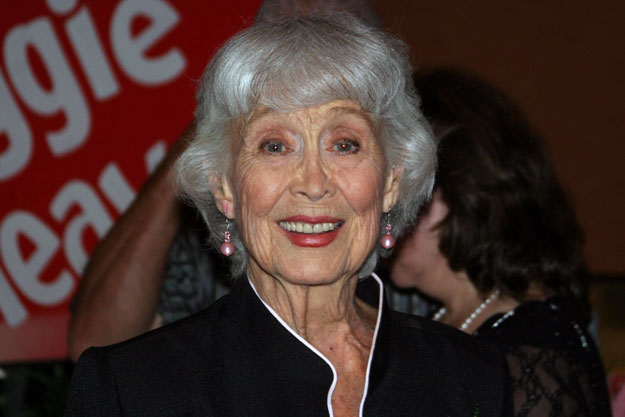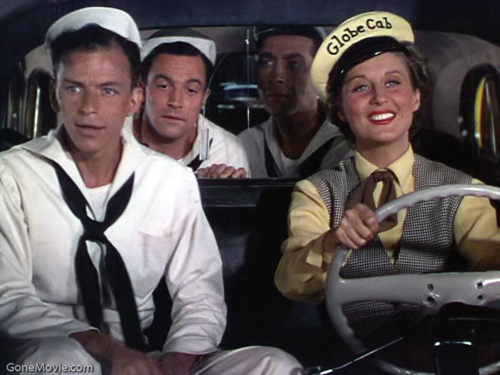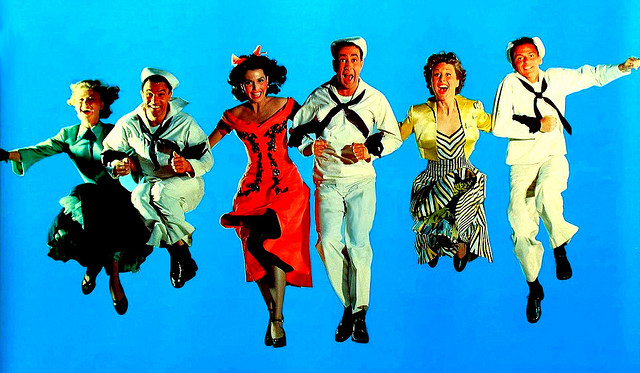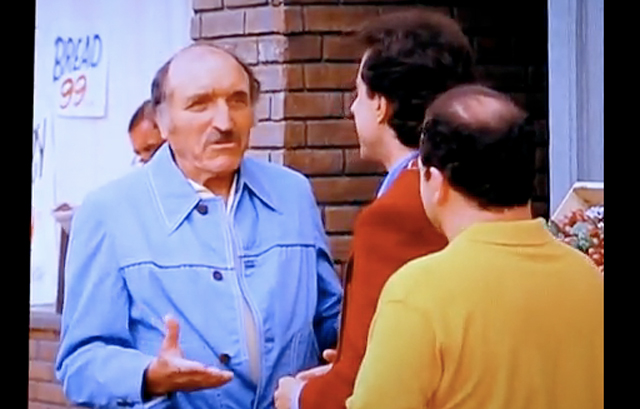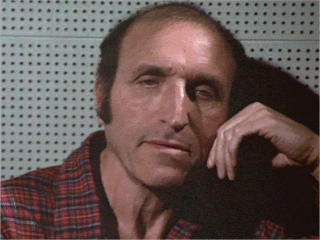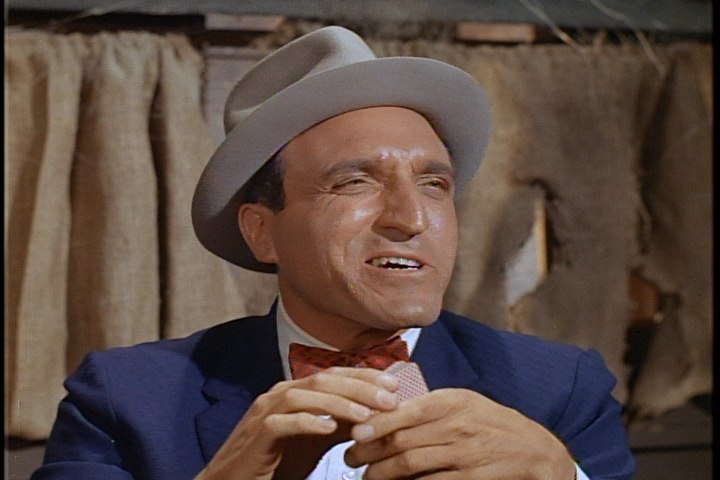‘With All Of It I Tried To Keep Smiling’
Betty Garrett
May 23, 1919-February 12, 2011
Betty Garrett, who died on February 12 at age 91, was a vivacious Broadway star best known for playing Frank Sinatra's sweetheart in On The Town (1949), in which she engaged Sinatra in two of the most entertaining duets he ever performed, before her career was capsized by the Hollywood blacklist controversy of the early 1950s. Testifying before a Congressional committee in 1951, Garrett's husband, Academy Award-nominated actor Larry Parks, admitted to having once been a member of the Communist party; though not called to testify herself, Garrett was guilty by association, as far as Hollywood studios were concerned. An entire generation grew up after her indelible turn in On The Town, having little or no memory of her impressive stage and screen work (or the Commie witch hunt) but embracing her as the spunky singing-and-dancing five-time-divorcee landlady Edna Babish De Fazio in the hit sitcom Laverne & Shirley, a role Garrett played during the first five seasons of the show’s six-season run (1976-1983). (She became a six-time divorcee at the series' end, when she dumped Laverne's father.)
"Certainly the blacklist hurt the careers of a great many people," she told producer/director Rich McKay in an interview for McKay's 2004 film, Broadway: The Golden Age. "And most of the actors who had been Broadway actors, New York actors, who had come out here, went back because there was nothing for them here anymore. And there was no blacklist in the theater, thank God. Larry and I were able to take a show on the road, we were able to play summer stock every summer, even after the blacklist hit us; we were able to put together a variety act, or vaudeville act, and play Las Vegas. There was no blacklist in Las Vegas, which was interesting. We were able to go to England and play the Palladium. We were able to keep working outside of film. Larry never did work in film until the last picture he made, which was Freud. Certainly it drove a lot of actors away from Hollywood."
Frank Sinatra and Betty Garrett in On the Town, 'Come Up To My Place,' one of the silver screen's greatest duets. Lyrics by Adolph Green and Betty Comden, music by Leonard Bernstein. Gene Kelly and Jules Munshin share the back seat of Garrett's cab. Garrett's feisty, man-hungry Brunhilde Esterhazy role is essentially an extension of the Shirley Delwin character she played in the previous Kelly-Sinatra musical, also from 1949, the Busby Berkeley-directed Take Me Out To the Ballgame. Click here to see the entire frantic scene.Following the blacklisting Garrett did not work in film again until 1955, when she was called to replace Judy Holliday as Janet Leigh's sister alongside Jack Lemmon in the musical My Sister Eileen. Despite receiving critical acclaim for her efforts, Garrett, like many blacklisted actors, found Hollywood still unreceptive. She moved to New York, where she was able to work in the nascent medium of television, on stage and in summer stock.
Her troubles began in 1951 when American congressmen forced Parks to testify about his earlier membership of the Communist Party. Parks had earned stardom and an Academy Award nomination as best actor for his dynamic portrayal of the singer Al Jolson in the film The Jolson Story (1946). But in 1951, he was called before the House Un-American Activities Committee and admitted that he had joined the Communist Party in 1941 and left in 1944 or 1945.
Betty Garrett, too, had also had a brief dalliance with the party but was not called to testify, perhaps, she said, because she was heavily pregnant with her second son. Nevertheless the couple were blacklisted and forced out of Hollywood.
"With all of it I tried to keep smiling," Garrett recalled in 2004. "I always say if one loses ones sense of humor it's the end of everything and one might as well turn out the light."
Betty Garrett was born on May 23 1919 in St Joseph, Missouri. Her father, a travelling salesman, moved his wife and daughter to Seattle, but he died of alcoholism when Betty was two. Her mother married an old flame and moved to Canada, only to discover that Betty's stepfather was in love with a man he had met at a meat packing company. Betty Garrett recalled that all her woes at home meant she was craving an alternative life, "and that life was the make-believe of the movies and theater.”
Although not Roman Catholic, she attended Catholic schools where she demonstrated a talent for dancing and acting. In 1936, a family friend arranged for the 17-year-old Garrett to meet famed dancer Martha Graham. Graham recommended Garrett for a scholarship at the Neighborhood Playhouse in New York. "I graduated from high school at 16 and came right to New York," Garrett recalled.
Betty Garrett reflects on her career in Rich McKay's Broadway: The Golden Age (2004)Garrett's stage debut came in Danton's Death at Orson Welles' Mercury Theatre in 1938. Later shows included All in Fun, Something for the Boys, Laffin' Room Only and Bells Are Ringing. She also danced with the Martha Graham troupe, worked summers in the Borscht Belt, and even wore a fake jewel in her navel as a $25-a-week chorus girl in the Latin Quarter in Boston. In 1941 she joined the Communist Party.
She was cast in Call Me Mister on Broadway opposite Harold Rome, Jules Munshin and Virginia Davis. Her performance in this role, her biggest break to date, did not go unnoticed in Hollywood. In January 1947 she signed a 12-month contract with MGM.
Garrett made her film debut as Shoo Shoo O'Grady in Big City (1948) with the then child actress Margaret O'Brien, Robert Preston and Danny Thomas. She joined an all-star cast including Judy Garland, Mickey Rooney, Lena Horne, Gene Kelly, Ann Southern, Vera-Ellen, Janet Leigh, Cyd Charisse, Perry Como, Mel Tormé and June Allyson for Words and Music (also 1948), the fictionalized story of the songwriting partnership of Richard Rodgers and Lorenz Hart.
Betty Garrett as Shoo Shoo O’Grady in her film debut, Big City (1948), sings 'Oka Doka Baby.' Directed by Norman Taurog, the film starred Margaret O'Brien, Robert Preston and Danny Thomas. Big City also marked the film debut of the singing voice of Marni Nixon, who made a career of dubbing the singing voices of non-singing actresses, such as Deborah Kerr (twice, in The King and I and An Affair to Remember), Natalie Wood (in West Side Story) and Audrey Hepburn (in My Fair Lady). Ms. Nixon did not dub Betty Garrett's voice, however.1949 was a breakout year for Garrett, as she played co-starring roles in three memorable movies. Along with Esther Williams, Frank Sinatra, Gene Kelly and Jules Munshin, she was featured in the Busby Berkeley-directed Take Me Out to the Ball Game, the second of a trilogy of men-at-large films starring Kelly, Sinatra and Munshin released between 1945 (the George Sidney-directed Anchors Aweigh) and 1949; later that year joined Williams again as her scatterbrain sister in Neptune's Daughter, starring Red Skelton, with whom Garrett engaged in a comical duet on "Baby, It's Cold Outside."
Her most memorable film role of 1949 and of her career came in the Gene Kelly-Stanley Donen-directed On The Town as the amorous taxi driver Hilde Esterhazy who pursues Sinatra with the racy song "Come Up To My Place." With a script and songs by Adolph Green and Betty Comden, the film follows three sailors, Gabey, Chip and Ozzie (Gene Kelly, Frank Sinatra and Jules Munshin, respectively) on a day of shore leave in New York City, as they seek fun and romance before their 24 hours are up. Ann Miller and Vera-Ellen co-starred. In one of the silver screen's delightful duets, Garrett, carting Sinatra alone in her cab, tries to lure the swabbie up to her apartment, only to find he's more interested in sightseeing, thus precipitating a hilarious mating dance played out inside the cab as Garrett repeatedly entreats the elusive Sinatra with an insistent, "Let's go to my place!" Later, after Chip (Sinatra) warms up to Hilde on the observation deck of the Empire State Building, the couple engages in a classic, gently swinging romantic duet, "You're Awful," a Camden-Green song built on homonyms--"you're frightening-frightening me when you say that you might go away"; "you're boring-boring into my heart."--that signals Chip's growing infatuation with the smitten Hilde, in a delightful scene sealed with a kiss.
Working with Sinatra, she said later, was a dream come true: "I was in on the end of what they called the golden years. I met Gable and Tracy and, of course, Gene Kelly and Sinatra. To grow up with Frank being your idol and then suddenly being his leading lady is an extraordinary fantasy lived out."
On the Town, dramatis personae: (from left) Vera-Ellen, Gene Kelly, Ann Miller, Jules Munshin, Betty Garrett, Frank Sinatra. Click here to see Frank Sinatra (Chip) and Betty Garrett (Hilde) dueting on Comden-Green's 'You're Awful,' marking the moment when Chip admits his growing affection for Hilde.
Following their blacklisting, Garrett and husband Parks she joined touring companies and starred at the London Palladium with The Al Jolson Story. The couple returned to London with the show on two further occasions.
After leaving Laverne & Shirley ahead of the series' final season, Garrett continued to work in television in the '80s and '90s, appearing in All in the Family, Murder She Wrote and The Golden Girls. In 2006 she made a guest appearance in Grey's Anatomy and in 2009 returned to the big screen in the horror film Dark and Stormy Night. As recently as last year she had starred in her one-woman show, Betty Garrett and Other Songs, the title of her 1998 autobiography.
Betty Garrett and Mickey Rooney in the fictionalized story of Rodgers and Hart, Words and Music (1948), directed by Norman Taurog. Betty sings ‘There’s a Small Hotel.’In recent years Garrett had been teaching, and the week before her death gave a class in musical comedy at Theatre West, the non-profit theatre she helped found in North Hollywood in 1960 and subsequently appeared in many of its productions, including Nunsense, Waiting in the Wings, and a revue, Betty Garrett, Closet Songwriter. She also appeared in many benefits for S.T.A.G.E. Garrett received the Career Achievement Awards from the Los Angeles Drama Critics' Circle and the Ovation Awards, among other honors.
In a 2009 interview with the Los Angeles Times, Garrett reflected on her long career. "People say, how come you've lasted this long?" she said. "I say I think it's because all of my life I have gotten to do what I love to do."
When Betty Garrett married Larry Parks in 1944, the actor Lloyd Bridges was best man and she subsequently became godmother to his son, Jeff Bridges. Larry Parks died in 1975. Their two sons survive her.
Betty Garrett and Red Skelton, 'Baby, It's Cold Outside,' from Neptune's Daughter (1949), also starring Esther Williams and Ricardo Montalban. Directed by Edward Buzzell from a script by Dorothy Kingsley.
***
'Jerry! Hellooooo!
Len Lesser
December 3, 1922-February 16, 2011
From an unremarkable beginning with a role in Two Sharp Knives on the early TV series Studio One in Hollywood in 1949, actor Len Lesser built a thoroughly remarkable 60-year career in movies and most notably on television. Of all his laudable credits, none will be more fondly remembered than his 15-episode tenure with the classic sitcom Seinfeld as Jerry's Uncle Leo. Always greeting his nephew with knees bent, arms outstretched and a hearty, "Jerry! Helloooo!", the overbearing but loveable Leo became one of the series' most popular characters--everybody's favorite Jewish uncle. Of even greater personal satisfaction to Lesser was one of his jobs that never made headlines--as an acting coach at the Canterbury Avenue Elementary School in a low-income San Fernando Valley neighborhood in Arleta, CA.
Len Lesser died of cancer-related pneumonia in Burbank, CA, on February 16. He was 88.
Uncle Leo, kleptomaniac, in 'The Bookstore' episode of Seinfeld. 'I'm an old man. I'm confused! I thought I paid for it! What's my name? Could you take me home?'"He's the kind of guy who is a total nuisance at times and the kind of guy you avoid," said the bald, moustached actor of his character. Lesser joined the sitcom during its second season (1991) and appeared, on and off, until the end of the show's lengthy run, in 1998. For the rest of his life, Lesser was greeted everywhere by fans shouting: "Uncle Leo!"
The character actor, who enjoyed a 60-year screen career, was also known to television audiences as Garvin (1996-2004), a friend of the title character's father, in another sitcom, Everybody Loves Raymond. Again, Lesser's character habitually used a greeting that became a catchphrase. "Hey, Ray's here!" he exclaimed.
Born and raised in the East Bronx in New York, Lesser started acting at the Juvenile House community centre when he was 16. "Acting opened up a whole new world of expression for me, as I was quite shy and inarticulate, and the applause and attention was really heady," he recalled.
He studied economics and government at the City College of New York. On graduating in 1942, he served in the army during the second world war, fighting in China, Burma and India, and rose to the rank of sergeant.
On being discharged in 1946, Lesser headed back to New York, intent on pursuing a stage career. He studied at the American Theatre Wing, which was then opening an acting school for war veterans, and landed his first professional work as an extra with the then New York City Center Opera Company (now the New York City Opera), earning $2 per performance. During his third season there, he was put in charge of all the extras, a promotion that quintupled his pay to $10 per performance.
Lesser auditioned with CBS and made his television debut in the play Two Sharp Knives (1949) on Studio One in Hollywood. After moving to Los Angeles in 1954, he was rarely out of work.
Over the next 55 years, he played more than 100 characters on television, showing his versatility by switching between drama and comedy, and taking multiple roles in series such as The Red Skelton Show (1959-62), Get Smart (1965-67), My Favorite Martian (1965-66), The Monkees (1966-67), Bonanza (1970-72) and Kojak (1974).
Lesser also had bit parts in dozens of feature films, appearing alongside Steve McQueen in Papillon (1973) and Clint Eastwood in both Kelly's Heroes (1970) and The Outlaw Josey Wales (1976).
His final screen role, at the age of 87, was in an episode of the television crime series Castle (2009). Last year he played the wise grandfather in Clifford Odets's Depression-era play Awake and Sing! with the southern California classical repertory theater company A Noise Within. One critic remarked: "Lesser nearly steals the show several times."
Len Lesser, Clint Eastwood in The Outlaw Josey WalesAs reported by the Los Angeles Times's education editor Beth Shuster, Lesser's most important role was one even his most devoted fans may not have been aware of--as an acting coach at the Canterbury Avenue Elementary School in a low-income San Fernando Valley neighborhood in Arleta, CA. Working with his friend, Canterbury's then-magnet coordinator, Marchand Erickson, he co-directed Fiddler on the Roof, The Wizard of Oz and Oliver!, to name a few of the school's ambitious productions.
"He worked with students who'd never acted before; some were immigrants more fluent in the language of their parents," wrote Shuster. "He urged them to project, look at each other, feel the emotion of the plays. When the script called for it, he urged the squirmy elementary kids to hold hands, even kiss. It could be incredibly awkward. I never saw him lose his temper or heard him raise his voice.
"But really he was just one of us. The moms who could sew made costumes, the dads who could paint made the sets and the rest of us found any job we could do. (Let's just say some of us were really good at selling pizza and drinks at intermission.) Whatever you could do, you did."
"He was probably even more excited and enthusiastic about it than his work on 'Seinfeld,'" said Tama Ryder, an author who spent a year with Lesser writing his not-yet published memoirs, Where's the Watch?! and Other Tales From Seinfeld's Uncle Leo. "He loved kids and being with children. Being around all those kids kept him young too."
Shuster: He certainly didn't take it too seriously. He joked about the kids who didn't learn their lines, wouldn't pay attention. His son, David Lesser, said he talked about how hard it was to work with kids rather than adults.
He adored acting and he wanted to pass on that passion, his son said.
"There was no mistaking my dad's love for the theater and acting," David Lesser said recently. "That Canterbury experience was really an outpouring of his love for his craft."
And it wasn't just Canterbury where Lesser spent his off-hours. His son said he volunteered at a North Hollywood senior citizens home and taught drama to special education students. He helped out at an adoption center. "He had a heart," his son said.
The kids appreciated him. On every closing night, when they handed out bouquets (yes, bought by a parent), there was always one for Lesser--their acting coach.
A tribute to Len Lesser, posted on YouTube by YoungMulaVidzThe actor and his wife, Jan Burrell, were divorced in 1982 after 28 years of marriage. In addition to their son, David, Lesser is survived by a daughter, Michele, and three grandchildren.
Upon hearing of Lesser’s passing, Jason Alexander, Seinfeld’s hapless George Costanza, posted a remembrance on Twitter: Len was a tremendous guy. He was a smart actor/comedian who knew exactly what he was doing in the creation of Uncle Leo. I enjoyed many wonderful conversations with Len who was so openly grateful to be part of our show and so humble about his stunning contribution to it. I am so happy to have known him and my sympathies go to his family. But his was a fun life and he leaves many fans behind and many who will be enjoying his work for years to come.
"Hellooo" Uncle Leo. And goodbye. Sleep well. Much love.
Founder/Publisher/Editor: David McGee
Contributing Editors: Billy Altman, Laura Fissinger, Christopher Hill, Derk Richardson
Logo Design: John Mendelsohn (www.johnmendelsohn.com)
Website Design: Kieran McGee (www.kieranmcgee.com)
Staff Photographers: Audrey Harrod (Louisville, KY; www.flickr.com/audreyharrod), Alicia Zappier (New York)
E-mail: thebluegrassspecial@gmail.com
Mailing Address: David McGee, 201 W. 85 St.—5B, New York, NY 10024


